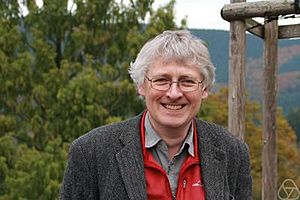Trevor Wooley facts for kids
Quick facts for kids
Trevor D. Wooley
|
|
|---|---|

Trevor D. Wooley
|
|
| Born | 17 September 1964 United Kingdom
|
| Nationality | British |
| Alma mater | Imperial College London University of Cambridge |
| Known for | Analytic number theory Diophantine equations Hardy–Littlewood circle method |
| Awards | Fellow of the Royal Society Salem Prize Berwick Prize (1993) |
| Scientific career | |
| Fields | Mathematician |
| Institutions | Purdue University |
| Doctoral advisor | Robert Charles Vaughan |
Trevor Dion Wooley (born on September 17, 1964) is a very talented British mathematician. He is currently a Professor of Mathematics at Purdue University in the United States. Professor Wooley is famous for his important discoveries in a part of math called analytic number theory. This area of math uses tools from calculus to solve problems about whole numbers.
He also works on Diophantine equations, which are special equations where you only look for whole number solutions. He uses something called the Hardy–Littlewood circle method and studies "exponential sums." These are advanced math tools that help solve complex number problems. One of his biggest achievements was making huge progress on Waring's problem, a famous math puzzle. For this work, he received the Salem Prize in 1998.
Early Life and Education
Trevor Wooley earned his first degree, a bachelor's degree, in 1987 from the University of Cambridge. He then continued his studies and received his PhD in 1990 from the University of London. His PhD supervisor, who guided his research, was another well-known mathematician named Robert Charles Vaughan.
Awards and Recognitions
Professor Wooley has received many important awards and honors for his contributions to mathematics. These awards show how much his work is valued by other scientists around the world.
- 1993–1995: He was named an Alfred P. Sloan Research Fellow. This fellowship helps support promising young scientists.
- 1998: He won the Salem Prize. This award is given to young mathematicians for outstanding work in Fourier series and related fields.
- 2002: He was invited to speak at the International Congress of Mathematicians in Beijing, China. This is a very prestigious invitation, showing his importance in the math community.
- 2007: He was elected a Fellow of the Royal Society. Being a Fellow of the Royal Society is one of the highest honors a scientist in the United Kingdom can receive.
- 2012: He was awarded the Fröhlich Prize. This prize recognizes mathematicians for their original and outstanding work.
- 2012: He also became a Fellow of the American Mathematical Society. This honor is given to members who have made significant contributions to math.
- 2014: He was again invited to speak at the International Congress of Mathematicians, this time in Seoul, South Korea.
 | Toni Morrison |
 | Barack Obama |
 | Martin Luther King Jr. |
 | Ralph Bunche |

